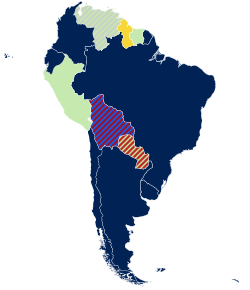| Part of the LGBTQ rights series |
Many countries in the Americas grant legal recognition to same-sex unions, with almost 85 percent of people in both North America and South America living in jurisdictions providing marriage rights to same-sex couples.
Contents
- Maps
- Current situation
- National level
- Sub-national level
- 2018 Inter-American Court of Human Rights advisory opinion
- Future legislation
- Civil unions
- Public opinion
- See also
- Notes
- References
In North America, same-sex marriages are recognized and performed without restrictions in Canada, Costa Rica, Cuba, Mexico, and the United States. [nb 1]
Same-sex marriages are also performed in the Dutch territories of Aruba, Curacao, Bonaire, Sint Eustatius and Saba, the Danish autonomous territory of Greenland, and in all French overseas departments and collectivities (Guadeloupe, Martinique, Saint Barthélemy, Saint Martin and Saint Pierre and Miquelon). Furthermore, Sint Maarten recognizes same-sex marriages performed in the Netherlands. The British Territories of Bermuda and the Cayman Islands also perform civil partnerships.
In South America, same-sex marriages are recognized and performed without restrictions in Argentina, Brazil, Chile, Colombia, Ecuador and Uruguay as well as the jurisdictions of French Guiana, the Falkland Islands and South Georgia and the South Sandwich Islands. Free unions that are equivalent to marriage have begun to be recognized in Bolivia.





